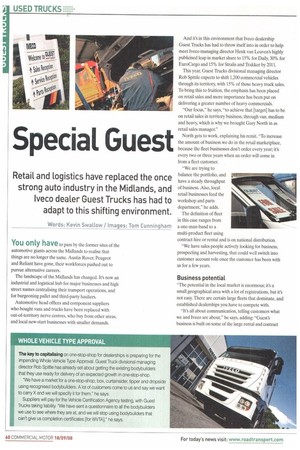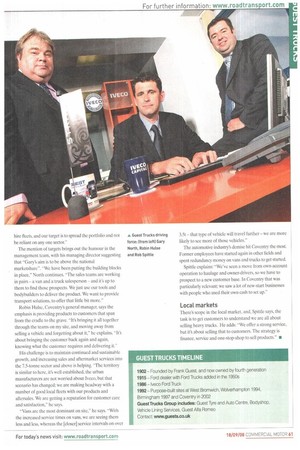Special Guest
Page 60

Page 61

If you've noticed an error in this article please click here to report it so we can fix it.
Retail and logistics have replaced the once strong auto industry in the Midlands, and Iveco dealer Guest Trucks has had to adapt to this shifting environment.
Words: Kevin Swallow / Images: Tom Cunningham You only have to pass by the former sites of the automotive giants across the Midlands to realise that things are no longer the same. Austin Rover, Peugeot and Reliant have gone, their workforces pushed out to pursue alternative careers.
The landscape of the Midlands has changed. It's now an industrial and logistical hub for major businesses and high street names centralising their transport operations, and for burgeoning pallet and third-party hauliers.
Automotive head offices and component suppliers who bought vans and trucks have been replaced with out-of-territory nerve centres, who buy from other areas, and local new-start businesses with smaller demands. And it's in this environment that Iveco dealership Guest Trucks has had to throw itself into in order to help meet Iveco managing director Henk van Leuven's highly publicised leap in market share to 15% for Daily, 30% for EuroCargo and 15% for Stralis and Trakker by 2011.
This year, Guest Trucks divisional managing director Rob Spittle expects to shift 1,200 commercial vehicles through its territory, with 15% of those heavy truck sales. To bring this to fruition, the emphasis has been placed on retail sales and more importance has been put on delivering a greater number of heavy commercials.
"Our focus," he says, "to achieve that [target] has to be on retail sales in territory business, through van, medium and heavy, which is why we brought Gary North in as retail sales manager."
North gets to work, explaining his remit. "To increase the amount of business we do in the retail marketplace, because the fleet businesses don't order every year; it's every two or three years when an order will come in from a fleet customer.
"We are trying to balance the portfolio, and have a steady throughput of business. Also, local retail businesses feed the workshop and parts department," he adds.
The definition of fleet in this case ranges from a one-man-band to a multi-product fleet using contract hire or rental and is on national distribution.
"We have sales people actively looking for business, prospecting and harvesting, that could well switch into customer account role once the customer has been with us for a few years.
Business potential
"The potential in the local market is enormous; it's a small geographical area with a lot of registrations, but it's not easy. There are certain large fleets that dominate, and established dealerships you have to compete with.
"It's all about communication, telling customers what we and Iveco are about," he says, adding: "Guest's business is built on some of the large rental and contract hire fleets, and our target is to spread the portfolio and not be reliant on any one sector."
The mention of targets brings out the humour in the management team, with his managing director suggesting that "Gary's aim is to be above the national marketshare". "We have been putting the building blocks in place," North continues. "The sales teams are working in pairs — a van and a truck salesperson — and it's up to them to find those prospects. We just use our tools and bodybuilders to deliver the product. We want to provide transport solutions, to offer that little bit more."
Robin Hulse, Coventry's general manager, says the emphasis is providing products to customers that span from the cradle to the grave. "It's bringing it all together through the teams on my site, and moving away from selling a vehicle and forgetting about it," he explains. "It's about bringing the customer back again and again, knowing what the customer requires and delivering it."
His challenge is to maintain continued and sustainable growth, and increasing sales and aftermarket services into the 7.5-tonne sector and above is helping. "The territory is similar to here, it's well established, the urban manufacturers are not worried about Iveco, but that scenario has changed; we are making headway with a number of good local fleets with our products and aftersales. We are getting a reputation for customer care and satisfaction," he says.
"Vans are the most dominant on site," he says. "With the increased service times on vans, we are seeing them less and less, whereas the [closer] service intervals on over 3.5t — that type of vehicle will travel further — we are more likely to sec more of those vehicles."
The automotive industry's demise hit Coventry the most. Former employees have started again in other fields and spent redundancy money on vans and trucks to get started.
Spittle explains: "We've seen a move from own-account operation to haulage and owner-drivers, so we have to prospect to a new customer base. In Coventry that was particularly relevant: we saw a lot of new-start businesses with people who used their own cash to set up."
Local markets
There's scope in the local market, and, Spittle says, the task is to get customers to understand we are all about selling heavy trucks. He adds: "We offer a strong service, but it's about selling that to customers. The strategy is finance, service and one-stop-shop to sell products." E












































































































































































